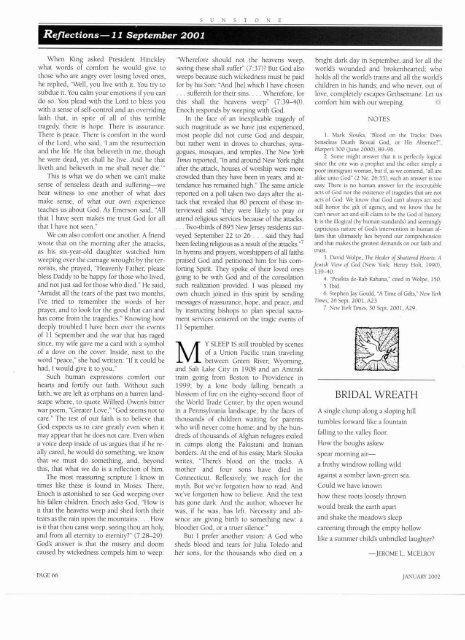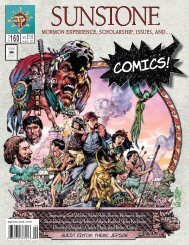Eugene England - Sunstone Magazine
Eugene England - Sunstone Magazine
Eugene England - Sunstone Magazine
Create successful ePaper yourself
Turn your PDF publications into a flip-book with our unique Google optimized e-Paper software.
When King asked President Hinckley<br />
what words of comfort he would give to<br />
those who are angry over losing loved ones,<br />
he replied, "Well, you live with it. You try to<br />
subdue it. You calm your emotions if you can<br />
do so. You plead with the Lord to bless you<br />
with a sense of self-control and an overriding<br />
faith that, in spite of all of this temble<br />
tragedy, there is hope. There is assurance.<br />
There is peace. There is comfort in the word<br />
of the Lord, who said, 'I am the resurrection<br />
and the life. He that believeth in me, though<br />
he were dead, yet shall he live. And he that<br />
liveth and believeth in me shall never die."'<br />
This is what we do when we can't make<br />
sense of senseless death and suffering-we<br />
bear witness to one another of what does<br />
make sense, of what our own experience<br />
teaches us about God. As Emerson said, "All<br />
that I have seen makes me trust God for all<br />
that I have not seen."<br />
We can also comfort one another. A friend<br />
wrote that on the morning after the attacks,<br />
as his six-year-old daughter watched him<br />
weeping over the carnage wrought by the terrorists,<br />
she prayed, "Heavenly Father, please<br />
bless Daddy to be happy for those who lived,<br />
and not just sad for those who died." He said,<br />
"Amidst all the tears of the past two months,<br />
I've tried to remember the words of her<br />
prayer, and to look for the good that can and<br />
has come from the tragedies." Knowing how<br />
deeply troubled I have been over the events<br />
of 11 September and the war that has raged<br />
since, my wife gave me a card with a symbol<br />
of a dove on the cover. Inside, next to the<br />
word "peace," she had written: "If it could be<br />
had, I would give it to you."<br />
Such human expressions comfort our<br />
hearts and fortify our faith. Without such<br />
faith, we are left as orphans on a barren landscape<br />
where, to quote Wilfred Owen's bitter<br />
war poem, "Greater Love," "God seems not to<br />
care." The test of our faith is to believe that<br />
God expects us to care greatly even when it<br />
may appear that he does not care. Even when<br />
a voice deep inside of us argues that if he really<br />
cared, he would do something, we know<br />
that we must do something, and, beyond<br />
this, that what we do is a reflection of him.<br />
The most reassuring scripture I know in<br />
times like these is found in Moses. There,<br />
Enoch is astonished to see God weeping over<br />
his fallen children. Enoch asks God, "How is<br />
it that the heavens weep and shed forth their<br />
tears as the rain upon the mountains. . . . How<br />
is it that thou canst weep, seeing thou art holy,<br />
and from all eternity to eternity?" (7:28-29).<br />
God's answer is that the misery and doom<br />
caused by wickedness compels him to weep:<br />
"Wherefore should not the heavens weep,<br />
seeing these shall suffer" (7:37)? But God also<br />
weeps because such wickedness must be paid<br />
for by his Son: "And [he] which I have chosen<br />
. . . suffereth for their sins. . . . Wherefore, for<br />
this shall the heavens weep" (7:3940).<br />
Enoch responds by weeping with God.<br />
In the face of an inexplicable tragedy of<br />
such magnitude as we have just experienced,<br />
most people did not curse God and despair,<br />
but rather went in droves to churches, synagogues,<br />
mosques, and temples. The New York<br />
Times reported, "In and around New York right<br />
after the attack, houses of worship were more<br />
crowded than they have been in years, and attendance<br />
has remained high." The same article<br />
reported on a poll taken two days after the attack<br />
that revealed that 80 percent of those interviewed<br />
said "they were likely to pray or<br />
attend religious services because of the attacks.<br />
. . . Two-thirds of 895 New Jersey residents surveyed<br />
September 22 to 26 . . . said they had<br />
been feeling religious as a result of the attacks."'<br />
In hymns and prayers, worshippers of all faiths<br />
praised God and petitioned him for his comforting<br />
Spirit. They spoke of their loved ones<br />
going to be with God and of the consolation<br />
such realization provided. I was pleased my<br />
own church joined in t h spirit by sending<br />
messages of reassurance, hope, and peace, and<br />
by instructing bishops to plan special sacrament<br />
services centered on the tragic events of<br />
11 September.<br />
M<br />
Y SLEEP IS still troubled by scenes<br />
of a Union Pacific train traveling<br />
between Green River, Wyoming,<br />
and Salt Lake City in 1908 and an Amtrak<br />
train going from Boston to Providence in<br />
1999; by a lone body falling beneath a<br />
blossom of fire on the eighty-second floor of<br />
the World Trade Center; by the open wound<br />
in a Pennsylvania landscape; by the faces of<br />
thousands of children waiting for parents<br />
who will never come home; and by the hundreds<br />
of thousands of Afghan refugees exiled<br />
in camps along the Pakistani and Iranian<br />
borders. At the end of his essay, Mark Slouka<br />
writes, "There's blood on the tracks. A<br />
mother and four sons have died in<br />
Connecticut. Reflexively, we reach for the<br />
myth. But we've forgotten how to read. And<br />
we've forgotten how to believe. And the text<br />
has gone dark. And the author, whoever he<br />
was, if he was, has left. Necessity and absence<br />
are giving birth to something new: a<br />
bloodier God, or a truer silence."<br />
But I prefer another vision: A God who<br />
sheds blood and tears for Julia Toledo and<br />
her sons, for the thousands who died on a<br />
bnght dark day m September, and for all the<br />
world's wounded and brokenhearted; who<br />
holds all the world's trams and all the world's<br />
children m h ~s hands, and who never, out of<br />
love, completely escapes Gethsemane. Let us<br />
comfort h ~m wth our weepmg. #- ,<br />
NOTES<br />
1. Mark Slouka, "Blood on the Tracks: Does<br />
Senseless Death Reveal God, or His Absence?".<br />
Harper's 300 (June 2000),89-96.<br />
2. Some might answer that it is perfectly logical<br />
since the one was a prophet and the other simply a<br />
poor immigrant woman, but if, as we contend, "all are<br />
alike unto God" (2 Ne. 26331, such an answer is too<br />
easy. There is no human answer for the inscrutable<br />
acts of God nor the existence of tragedies that are not<br />
acts of God. We know that God can't always act and<br />
still honor the gift of agency, and we know that he<br />
can't never act and still claim to be the God of history.<br />
It is the illogical (by human standards) and seemingly<br />
capricious nature of Go& intervention in human affairs<br />
that ultimately lies beyond our comprehension<br />
and that makes the greatest demands on our faith and<br />
trust.<br />
3. David Wolpe, The Healer ofshattered Hearts: A<br />
]&h View of God (New York: Henry Holt, 1990).<br />
13940.<br />
4. "Pesikta de-Rab Kahana," cited in Wolpe, 150.<br />
5. Ibid.<br />
6. Stephen Jay Gould, "A Time of Gifts," New York<br />
Times, 26 Sept. 2001. A23<br />
7. New York Times, 30 Sept. 2001, A29.<br />
BRIDAL WREATH<br />
A single clump along a sloping hill<br />
tumbles forward like a fountain<br />
falling to the valley floor.<br />
How the boughs askew<br />
spear morning aira<br />
frothy windrow rolling wild<br />
against a somber lawn-green sea<br />
Could we have known<br />
how these roots loosely thrown<br />
would break the earth apart<br />
and shake the meadow's sleep<br />
careening through the empty hollow<br />
like a summer child's unbridled laughter?<br />
-JEROME<br />
L. MCELROY<br />
PAGE 66 JANUARY 2002

















